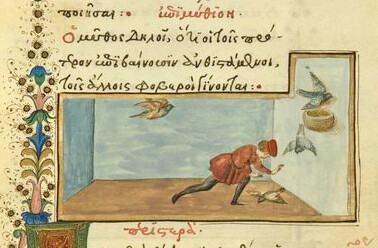HODIE: ante diem quintum decimum Kalendas Octobres (and yes, you can have your own Roman Google Calendar).
VERBUM HODIERNUM: Today's word is REDDO - read a brief essay about the word at the Verbosum blog. Here's one of the sayings you can find in the essay: Reddit fetorem stercus motum graviorem, "Stirred shit stinks worse" (and the Latin rhymes!).
MILLE FABULAE: New materials at the blog include lots more llustrated fables. This is also where you can download your free PDF copy of the Mille Fabulae et Una book.
FABULAE FACILES: The new easy-to-read fable is Mustela et Homo, the story of the weasel pleading for her life.
PODCASTS: Today's Latin audio fable is Mures, Feles, et Tintinnabulum, the famous story of belling the cat.
ENGLISH AESOP: Today's English fables are by Sir Roger L'Estrange, along with some rhyming verse fables by Oliver Herford.
TODAY'S MOTTOES & PROVERBS: Widgets available at SchoolhouseWidgets.com.
3-Word Mottoes: Today's 3-word motto is Non deest spes (English: There is no lack of hope).
3-Word Proverbs: Today's 3-word proverb is Caritas omnia potest (English: Love can do all things).
Rhyming Proverbs: Today's proverb with rhyme is: Plus probo thesaurum docti, quam divitis aurum (English: I more esteem the treasure of the learned man than the rich man's gold).
Vulgate Verse: Today's verse is Nunc hunc, nunc illum consumit gladius (II Samuel 11:25). For a translation, check out the polyglot Bible, in English, Hebrew, Latin and Greek, at the Sacred Texts Archive online.
Elizabethan Proverb Commentary: Here is today's proverb commentary, this time by Taverner: Dii facientes adiuvant: The Goddess do helpe the doers. Hereby is mente, that the heavenly power is an ayde and helpe, not to loyterers and idle persons, but to laborious and paineful folke, and such as put to their own good willes.
Today's Poem: Today's poem is one of the elegant little epigrams by Owen (3.131), with a word list at NoDictionaries.com:
Omnia fert aetas secum, aufert omnia secum.English: "Time brings all things with it, and it bears away all things; all things have their time and time has all things." What a perfect little epigram!
Omnia tempus habent, omnia tempus habet.
Today's image is for the story of the dove fooled by a painting, 512. Columba et Hydria Picta. Columba, siti compulsa, aquam ut inveniret, huc illuc ambulaverat. Conspecta deinde picta in pariete hydria, vas aqua plenum se invenisse credens, celeri impetu petiit potum. Sed semianimis illisa parieti concidit humi. Morti ergo vicina, sic secum locuta est, “Infelix ego et misera, quae, aquae nimis appetens, non cogitaram vitae periculum.” (source) - as usual, the Medici Aesop shows the three parts of the story in a single panel: the dove is flying, the dove hits the wall... and then there she is lying on the ground where the man discovers her.
